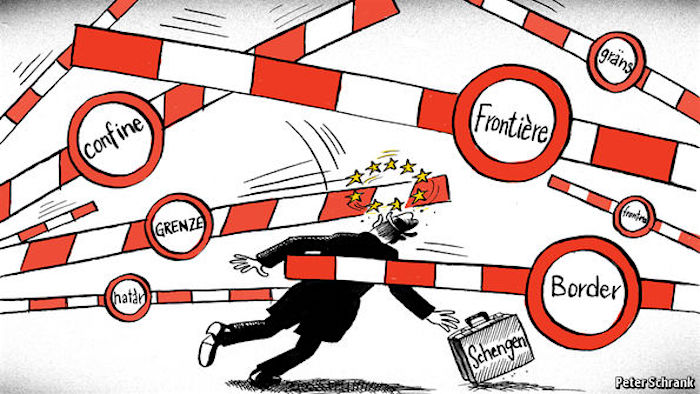Only "two months". That is the time span the Donald Tusk, the President of the European Council, has given to the EU to get to grips with the wave of refugees. After that point, he said on 19 January, the free movement of goods and people between the twenty-eight members states and four associated countries, the Schengen area, one of the major achievements of the European project, will soon be a mere memory.
Should this happen, countless border checkpoints would have to be reinstated, requiring a huge surge in the numbers of customs and police officers. Air travel would become much more difficult, queues of lorries would cause traffic jams up and down the continent, and cross-border commuters might risk losing their jobs because travel from one country to another would become too unpredictable.
Should this happen, it would be a bitter blow against European unity. Yet, in a bid to stop terrorist attacks or the arrival of refugees, seven countries in the Schengen area [Austria, France, Sweden, Denmark, Germany, Norway and Malta] have already restored border controls. While this is theoretically a temporary measure, the governments concerned are now stalling about lifting it because of the enormous pressure for national security.
A limit of two months is perhaps exaggerated, but ultimately Donald Tusk is right. The race is now on between a collapse in Schengen, on the one hand, and, on the other, reinforcing the EU's external borders and keeping Syrian refugees in Turkey, which lies on the path to Greece for Syrian refugees before they throw themselves, in the cold, against the slightly lower borders to the north.
Every day counts, since deploying European border police in Greece is taking some time and Turkey is not moving quickly on its own border controls, despite the promise of European money.
All is not lost, but we are in dangerous territory. What would be most concerning of all is that the re-establishment of national borders would resolve nothing. It would be far more drawn-out and costly to do that than to close the EU's external borders. National borders would not stop refugees from landing on European shores and staying in Greece or Italy, who would then have to take responsibility for them without the assistance of other member states. And it isn't national borders that will stop terrorist attacks, but rather sharing information and cooperation between national police forces.
National borders are reassuring, but are largely useless when their re-establishment would mean hindering European exchange, dealing a new blow to the EU's economic growth and disrupting a European unity that has already been under strain.
The EU is not working. The EU is unloved by its citizens. Over the next few months, its popularity will be measured by polls for the UK referendum. The EU, in spite of everything, will survive, but the last thing it needs is the end of the Schengen zone: after reaching that point, the uphill climb will just get even steeper.
Was this article useful? If so we are delighted!
It is freely available because we believe that the right to free and independent information is essential for democracy. But this right is not guaranteed forever, and independence comes at a cost. We need your support in order to continue publishing independent, multilingual news for all Europeans.
Discover our subscription offers and their exclusive benefits and become a member of our community now!












